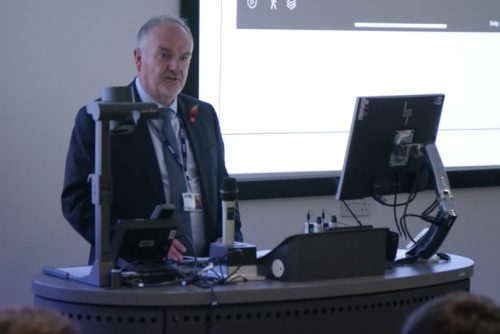University expanding Fourth Industrial Revolution support with latest programme

Liverpool John Moores University has stepped up its drive to help businesses exploit the Fourth Industrial Revolution.
The university launched its original programme, LCR4.0, in 2016, and is now targeting organisations throughout the Cheshire and Warrington region.
It hosted almost 70 businesses at its Byrom Street campus to explain the advantages and benefits that digital technology can offer companies in their bid to remain competitive, while at the same time harnessing the vast technological resources and academic expertise within the university’s ‘knowledge turbine’.

Opening the event, hosted by the Faculty of Engineering and Technology, Prof Mark Power, LJMU vice chancellor, said the modern industrial revolution requires a new breed of worker, armed with new knowledge, new skills and a new understanding of how the world works.
He said: “Just as the first industrial revolution required that dynamic collaboration between industry and education, this new fourth industrial revolution needs new partnerships between ourselves at the university, and you, as the businesses, the manufacturers, the innovative companies in Merseyside, Cheshire and Warrington.
He added: “We are committed to absolutely engaging with industry. This is an important part of our offer of opening up that dynamic range of tremendous academic expertise that we have in the faculty to help create new products and solve the challenges you face
“We are growing our research potential, investing heavily in our research areas and opportunities within that research activity for you to engage with us, as a university, hopefully to our mutual benefit.”

LJMU Maritime Simulator
Prof Nduku Ekere, pro vice chancellor of the Faculty of Engineering and Technology, said: “Digital technology is the bedrock of any developed economy today in the world and will be for the foreseeable future.
“In our faculty we have the research and we are leading in this field. We are leading in AI, cyber security, virtual reality, machine learning, you name it, we are experts in these fields.
“We take raw materials, we add value to those raw materials, and then we create wealth.”
He said the university can offer the expertise of more than 200 academic staff 4,500 students: “We are strongly committed to research and research collaboration, from big industries to SMEs. We are looking forward to working with you as you go forward through collaborative R&D, student projects, placements and internships. I hope this will be the start of a lasting relationship with you.”
And Anthony Walker, LJMU strategic manager, told attendees: “We have a rich history of industrial engagement here.
“Back in 2016 people were talking about this industry 4 concept. We thought, what can we do to try and help small companies to adopt this concept called Industry 4? So we put together a project, LCR4.0 which was the first one of its kind to try and help SMEs, particularly, to drive economic growth by using technology and innovation.”
During the three-year programme, the university worked with more than 300 SMEs. Mr Walker said: “It meant an increase in GVA of £90m to our economy, over 1,000 jobs on the back of that project.
“What normally happens is you deliver a project like that, you get funded for it, and then it stops, but we were determined not to let this stop, so we developed a legacy of different projects, one of those being CW4.0 which allows us to deliver services in Cheshire and Warrington.”
He added: “We use digital tech in innovation to overcome the challenges facing modern 21st century organisations.”
The faculty offers the skills and facilities of five key laboratories to help companies embrace technology to overcome challenges.
- Its engineering workshop provides advanced manufacturing, including a 3-D print farm which uses biodegradable plastics, metal and carbon fibre. One current project is printing plastic water turbines for Kenya.
- The sensor lab is working on a range of schemes, including hip displacia in babies, heat sensors and building sensors, alternative heating technologies for the future, as well as working with Everton FC on achieving its aim to deliver net zero status for its new stadium by 2030.
- LJMU’s maritime simulator offers a 360-degree ship’s bridge simulator to provide commercial courses for ship captains and pilots, as well as viability studies for port development or ship development. A recent R&D programme on the operation of a ship’s bridge revealed that young officers have stopped looking out of the bridge window, with 74% of participants concentrating on instrument panels instead, which could cause problems in the long term.
- A demonstration lab works with businesses to accelerate their products or processes to bring them to market much quicker.
- And the university’s Exemplar Housing Site is focused on the technologies of the future for the construction and housing industries. It comprises three houses built using construction techniques from 1920, 1970 and 2010, and two modern modular construction buildings, which give access to controlled environments to test different materials.
The benefits of collaborating with the university on its CW4.0 programme were evident at an expo, featuring a range of SMEs.
One, Pulse Systems, based in Sandbach, has worked with LJMU for 18 months. Managing director, Kevin Davies, explained: “We provide smart building management systems.
“Usually they sit on a wall. But now the tech sits in a device, eg, a heater, a light, or in air conditioning units that are all connected to the cloud.”
He said the company can generate up to 90% savings on energy spend, particularly in warehousing and logistics: “We’re applying modern technology to existing technology to generate extra savings.”
The company aims to raise awareness of its products through its links with LJMU: “We’re a bit of an undiscovered secret,” said Mr Davies.
And he revealed an internship deal with the university has bolstered its expertise: “LJMU gives us access to student talent. Our head of sales and marketing, Cleo Cosens, joined us from LJMU around two-and-a-half years ago. She’s doing a great job. If we can find more talent from internships with LJMU it is a great outcome for us and the university.”
Runcorn company, Knitwire, does what it says on the can, it knits wire for a range of industries, including the automotive sector and filtration.

Tim Forber
Tim Forber is operations director for the third generation family business that was founded in 1976. He said the firm established links with the university to keep pace with technological developments: “We want to keep ahead of the competition. We want to start digitising the data on the manufacturing side,” he said.
He added: “The diagnostic side of LJMU has helped us. We had two students do dissertations and we now have information to do a Knowledge Transfer Partnership (KTP), so we’re now able to apply for a grant for the KTP.”
Now, the company is planning to run a pilot scheme, as part of a £100,000 investment, to reduce costs and downtime and maintain its global competitiveness, particularly with the Asian market.
And Datahone, a company which was part of the original LCR4.0 project, has benefited from its collaboration with the university. Its technology provides real time monitoring systems for clients.

Cliff Brereton
CEO, Cliff Brereton, said: “We have worked together through LCR4.0 with a number of manufacturing companies and helped them become more productive through using our system, eg, more uptime and fewer rejects. We run monitor systems every second in the minute. If something goes wrong we can flag it up to management.”
So far, the firm has signed up two major clients through the university programme. Mr Brereton said: “It’s been a really good relationship for us. They are good people here and talented guys.”
SMEs in the Cheshire and Warrington region who would benefit from the fully funded support available from the CW4.0 programme are urged to contact Paula Brennan – p.e.brennan@ljmu.ac.uk







